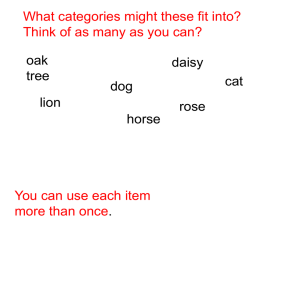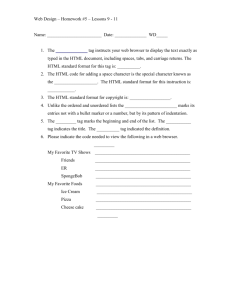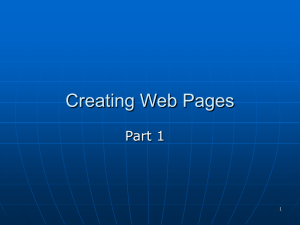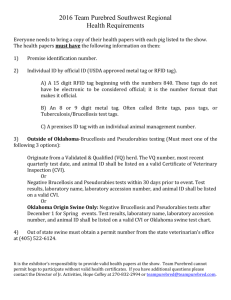Chris Butcher - Halo 2 Powerpoint
advertisement
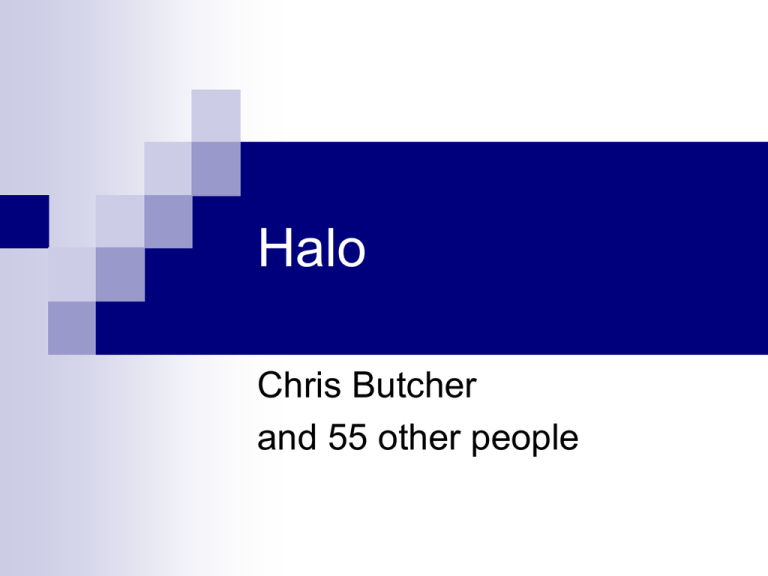
Halo
Chris Butcher
and 55 other people
Overview
Ancestry
Statistics
Resource Model
Runtime Data Architecture
Ancestry of the Halo Engine
As old as Bungie (Pathways, 1992)
Primarily written in C, some C++
Platform-neutral foundations
PC
/ Console
At heart, a world simulation engine
Vital Statistics: Code
1.5MLOC in 3,624 files for 53MB of source
Decent build times
Development build – 7:39
Xbox Shipping build (LTCG) – 10:06
Build farm (binaries) – 18 minutes
Build farm (complete game) – 53 minutes
Xbox
Shipping executable 4,861,952 bytes
Vital Statistics: Resources
70GB in source control (Source Depot)
Not
counting localization
Level load: 4 minutes
Level compile: 9 minutes
Compiled level load: ~700ms
Final shipping game: 4.2GB x8 SKUs
Vital Statistics: Development
34 month development time (12/01-10/04)
sound designers, 3
administrative, 2
producers, 3
localization testers, 14
engineers, 17
animators, 6
web / community, 8
test engineers, 5
technical artist, 1
game artists, 8
test staff, 10
designers, 7
hourly testers, 20
environment artists, 11
Resource Model
“Tag” File Organization
Unified Tag Editor
Loading / Post-Process
Compiled Cache Files
Memory Layout / Streaming
“Tag” Resources
Name is a historical artefact (Myth, 1995)
Singly-rooted hierarchical namespace
Stored as individual files on host system
Type: BIPED, Path: objects\characters\grunt\grunt
c:\halo2\tags\objects\characters\grunt\grunt.biped
99.99% of all data is a tag
Exceptions:
loading screens, fonts
Tag Structure
Hierarchy of variable-length ‘block’ arrays
Each
block contains 0-n fixed-size elements
Topmost block contains exactly 1 element
Block elements are built from atomic fields
Integer,
Enum, Floating point, String, Text
Flags, Map function, Pixel shader
Child blocks, Binary data blobs
References to other tags
Tag Block Definition
Blocks map directly to C structures
Described
by separate macro definition
struct ai_properties
{
word flags;
short ai_size;
TAG_BLOCK(ai_properties_block, 1,
sizeof(struct ai_properties), NULL, NULL)
{
{_field_flags, "ai flags", &ai_properties_flags},
{_field_enum, "ai size", &ai_size_enum},
string_id type_name;
real leap_jump_speed;
{_field_string_id, "ai type name"},
{_field_real, "leap jump speed"},
{_field_terminator}
};
};
Tag Block Definition
Definition structure allows introspection
Automatic
serialization of hierarchical tag
Byte-swapped upon load and save
Duplication, insertion, deletion of elements
Not needed at runtime (no RTTI)
Simple file format
Requires
exactly matching code and definition
Limited versioning support
Tag Data
11.6GB, 39,000 tags
To load a level:
Load
globals tag
Load scenario tag
Resolve dependencies
Typically 8,000 tags
130 types of tag
sound
render model
effect
other
bitmap
object model
animation graph
shader
collision model
physics model
Tag Editing (Guerilla)
Tag Editing
Automatic editing UI from definition
Additional
markup fields to format nicely
Some fields hidden or read-only
Unless
you use ‘expert mode’
Map editor is just custom UI on top of tags
Command-line tools all manipulate tags
Source Data
Anything not read by the game
Source
assets: PSD, MAX
Tool-ready intermediate: TIFF, AIFF, ASS
Command-line import tool
c:\halo2\data\scenarios\solo\03a_oldmombasa\work\arcology2.max
c:\halo2\data\scenarios\solo\03a_oldmombasa\structure\earthcity_3.ass
c:\halo2\tags\scenarios\solo\03a_oldmombasa\earthcity_3.structure_bsp
Produces one or more tags
Still
platform-neutral until load time
Artist Workflow
Import tools integrated into Guerilla GUI
Monitoring mode for automatic import
Single-click
export from Photoshop
Import times in 5 second range
Except
for level import, 10-30 minutes
Artists have release build of import tool
Tag Loading
Deserialize tag blocks into memory
For
“editing” or for “gameplay”
Bounds-check and sanitize all tag fields
Custom postprocess operations
Read-only
access to all dependent tags
Generation of platform-specific runtime data
Write out cacheable data as binary blobs
Loading is Slow!
Thousands of files
Xbox
path remap: xe:\halo2\tags\057\38
Byte-by-byte processing
Hundreds of thousands of mallocs
Still manageable but not great
1-5
minutes on Xbox
1-3 minutes on PC or 20 sec with warm cache
Reload Anything
Completely new copy of tag in memory
Game
must never store pointers to tag data!
Map or BSP reloads force level restart
Everything else on the fly
Game
receives callback after load
Must validate internal references to tag
Crash on reload == bug that must be fixed!
When to Reload
PC applications use filesystem monitoring
Both
game and map editor
Manually initiate tag sync with Xbox
Scan
hard drive of host system for changes
Copy any changed tags
Update path mapping file
Xbox client watches for new mapping file
The Payoff
Seamless editing environment
Change
any data, see it immediately (3-5 sec)
Everyone in the engine all the time
75%
of content authored on target system
Artists create directly for target environment
Unless it’s working in the engine, it’s not done
After many iterations becomes transparent
Compiled Levels
Development builds: 8,000 files
Pro:
Flexible, incremental editing, fast reload
Con: Initial load, memory usage, disk space
Profiling, testing, and ship builds: 1 file
Pro:
Fast load, memory optimized
Con: Non-editable, compile time, disk space
Built locally or by build farm
Cache File Building
Load level, perform final postprocessing
Divide up and stream data into partitions
Global
resource buffer
Zone-specific resource buffer
Cached data blocks
Debug information
180-270MB solo, 50-80MB multiplayer
1GB working set, machine becomes unusable
Cache Sharing
Duplication of data across levels
Solution: Cache file dependencies
Blocks
compared with dependent cache files
Write out reference to dependent file instead
Custom shared scenarios for SP & MP
Not
necessary to build a cache file
700MB -> 270MB ensures we fit on DVD-9
Cache Loading
Copy from DVD to HDD and decompress
Super fast load
Page
in global and initial zone resources
Global: 6-8MB, Zone: 2-5MB, read in <<1sec
No iteration or fixup necessary
Well... not strictly true due to Havok
Warm caches before rendering frame 0
Memory Layout
64MB physical memory on Xbox
13.9MB
for static globals
Kernel, Executable, Globals, Heap, Libraries
4MB
world state
3MB networking (MP only)
Tag resource buffers: Global + MAX(Zones)
Budget: 12MB or less
Everything
else (36-40MB): dynamic caches
Cache Architecture
Animation: 3MB solo, 4MB multiplayer
8-19MB
cacheable data, 2kb page size
Sound: 3MB
300-500MB
Geometry: 6.5MB solo, 7MB MP or co-op
20-45MB
cacheable data, 16kb page size
cacheable data, 4kb page size
Texture: Everything else (17-21 MB)
Other
systems temporarily steal from texture cache
80-140MB cacheable data, 4kb page size
Runtime Data Storage
Follows many principles of resource model
Per-system memory compartments
Decouple
Direct map from memory to savegame
Fast
and bound most failure cases
to load/save, good reproducibility
Data Interoperability
Less
ship-only bugs, ease of debugging
Datum Array
Fixed-length array allocation
Allocate only at first free index
Provides
locality and allows data protection
Fill upon allocate and deallocate
Access elements through 32-bit identifier
16-bit
index, 16-bit pseudounique ‘salt’
Datum Access
Known datum identifier (strong reference)
Asserts
absolute index bounds, matching salt
Compiles to &array->data[identifier & 0xffff]
Previous datum identifier (weak reference)
Salt
must be valid but can differ
Absolute index without salt
Through iteration
Easy Catches
Element access after delete/reallocate
Uninitialized or bitwise corrupted identifiers
Memory overruns
Through
data protection, mismatch to known
fill pattern, or salt overwrite
Access outside safe time periods
Application
launch, level load, zone switch
System Allocation Patterns
Constant usage pattern
Reserve memory at launch or level load
Code
execution path defines ordering
Basic memory types
Static
globals at file scope (discouraged)
Heap allocations (startup only)
Physical memory map (dynamic per level)
All Allocations are Bounded
Use datum arrays or pool based allocators
Zero heap allocations at runtime!
Incurs overhead due to unused space
Out-of-memory conditions are isolated
(Mostly.)
Easier
to design for, easy to test in isolation
Provides general stability under load on
multiple systems in unexpected situations
Big Exception: Havok
Heap usage highly predictable...
...
if results of simulation timestep are known
Page allocator uses fixed memory reserve
Monitor
usage after each timestep and GC
Tiered overflow pools for temporary excess
Must get rid of all excess each timestep
Intra-step allocations could blow all pools
Runtime Usage Classes
Categorized by lifetime and persistence
Global application state
Render
targets, system state, I/O, tags, cache
Deterministic world “gamestate”
Players,
objects, physics, scripting, AI, etc
Non-deterministic “world view”
Rendering,
sound, networking, input, UI, etc
Gamestate Memory
Gamestate systems allocate at launch
Sequential
allocation from 4MB buffer
Located at known addresses on PC and Xbox
Fixed initialization order and size
Each
gamestate memory chunk is always
allocated at the same virtual address
Savegame format
Write out gamestate buffer to file
Single
write <<1sec, or can be asynchronous
To load, read over in-memory gamestate
Apply
some small fixups before and after load
Clear references to non-deterministic state
Require compatibility between different
builds (debug vs release)
Determinism
Gamestate is deterministic with identical
input from external sources (players)
Somewhat
so between binaries and platforms
Some floating point issues
Majority of Havok not in the gamestate
Many
internal pointers and static storage
Recreate all Havok from gamestate upon load
Consequences
No #ifdef DEBUG in game data structures
No dependencies on world view
Including
game-affecting LOD (e.g. animation)
No dependencies on file I/O
Cannot
affect game based on caching!
No dependence on framerate or perf times
Many of these are good properties anyway
Summary
Lots of simple choices
Implications on engine and data design
are interesting
Questions?
Now,
or mailto: butcher@bungie.com

